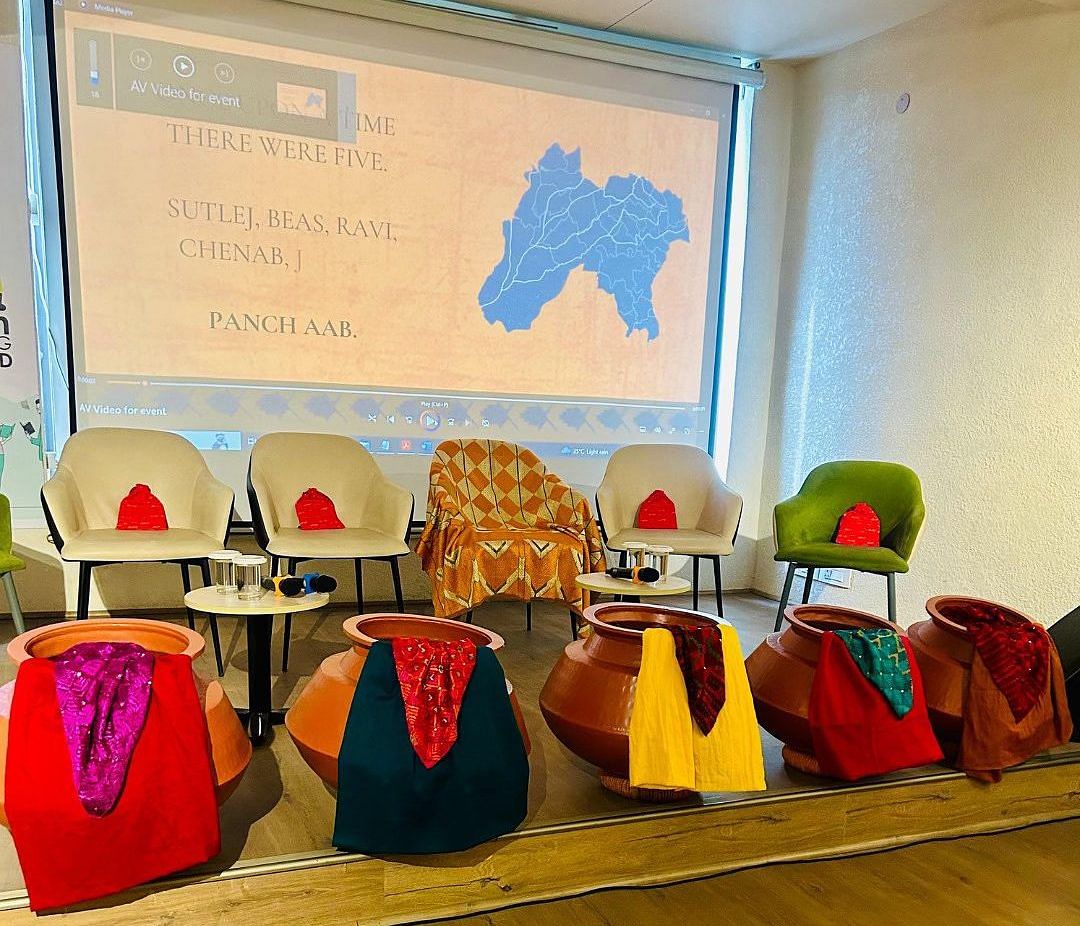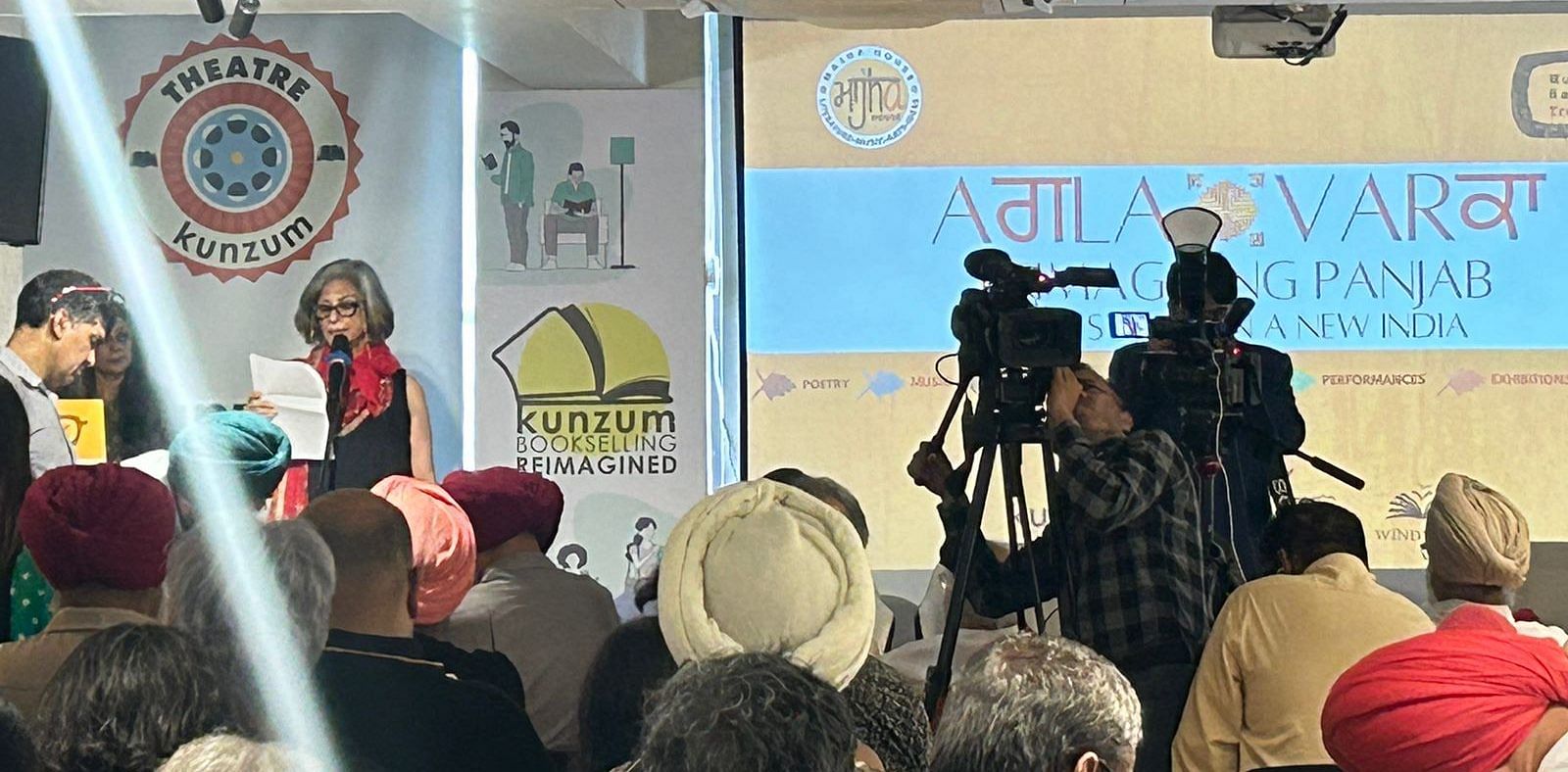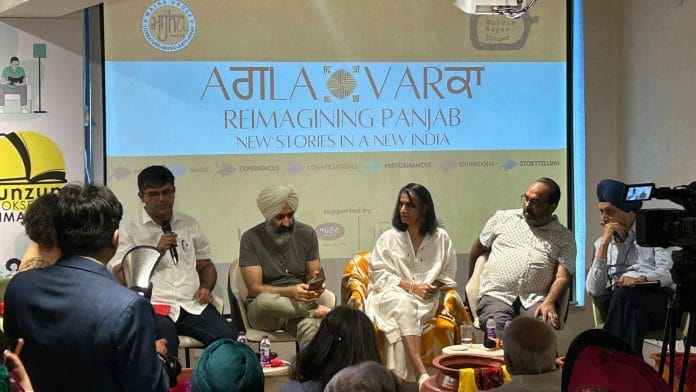New Delhi: Navtej Sarna was giving an interview on a television channel about the American presidential elections when the first tweet that flashed on the screen accused him of being “a potential Khalistani”. The audience at Kunzum Theatre in Delhi let out an instant synchronous gasp as the author and former Indian ambassador to the United States, United Kingdom, and Israel recounted the incident at a panel discussion on Punjab’s identity.
The talk was one of many events, from poetry and music to conversations and art exhibitions, at the inaugural day-long event ‘Agla Varka: Reimagining Panjab, New Stories in a New India’ held on 29 June.
“We are a very distinct identity,” said Sarna, highlighting that beyond physical attributes of Sikh identity, Punjabis stand out amid a landscape riddled with stereotypes. He noted that Punjabis are often portrayed either as biting into chicken legs, getting drunk on patialas, and dancing Bhangra, or as sword bearing, mighty warriors or even terrorists.
“So we vary somewhere between being a buffoon or a terrorist,” said Sarna, as the audience joined in on his wry chuckling.
But beyond the humour and stereotypes, Agla Varka’s aim was to disseminate and contextualise the Punjabi identity—embracing its cultural, political, religious, and historical significance within India . The event, organised by Amritsar’s cultural centre, Majha House, in collaboration with The Kuldip Nayar Trust, sought to dismantle the narrow narratives that confine Punjab to stereotypes.
“We want you to see the [true] spirit of Punjab—to go beyond Udta Punjab or Chamkila,” said editor Preeti Gill, the driving force behind Majha House. When films like these become blockbusters, they are often interpreted as Punjab’s sole truth. But 40 years after the 1984 anti-Sikh riots, Gill wants Punjabis to reclaim their narratives. “To design the counter of whatever is being said in films, songs, and the media.”

Majha House — the cultural hub
Central to this effort, Majha House is seeking answers to a fundamental question: Who is Punjab when its five rivers and fertile lands no longer define it?
The journey began in 2018 when Gill opened her family home in Amritsar to establish Majha House. Over six years, it has evolved into a vibrant cultural hub—a public platform for visual and performing arts and literature.
The heritage home that sits on pristine green lawns is a gathering place for artists, writers, musicians, and essayists—a modern-day salon with a distinctive Punjabi flavour. Under Gill, Majha House has hosted more than a hundred events, including talks, literary festivals, performances, and workshops. It also offers a residency space for writers and artists to research, write, and work.
In 2022, Majha House held The Nation at 75 – where Barkha Dutt was in conversation with Ramesh Inder Singh, former Chief Secretary of Punjab, about his latest book Turmoil in Punjab. Talks like Dakhalandazi interrogated gender-based violence in the state while articulating Punjabi feminism. Agla Varka aims to hold the second event in November.
But Majha House’s roots extend deep into Punjab’s history, tracing back to the turmoil of India’s independence and Partition. Named after the Majha region, which was violently divided during the 1947 Partition between India and Pakistan, the house serves as a poignant memorial. It commemorates the sacrifice of Gill’s husband’s brother—2nd Lt. Swaranjit Singh Gill, fondly known as Billoo—who died at 22 while serving in the 1971 war. The land on which Majha House stands today was bestowed upon his grieving parents in remembrance of his valour and began to be known as Billoo’s House.
“He died inside the tanks, my in-laws never got anything [remains] back; they were just told [about the death],” said Gill.

During the pandemic years, Majha House started organising online ‘addas’ that connected participants from all over the world. Gill credits these virtual gatherings with putting Majha House’s name on the national map. They are now planning to host more talks, events, and festivals in other parts of India, with Delhi as their starting point.
Gill’s vision for Majha House is clear—to challenge prevailing narratives and reveal that there is more to Punjab beyond what we know and what is shown.
“In my home, there is a great deal of anger because you’re misrepresenting almost everything there is,” she said, talking about the media portrayal of Punjab. “There is a constant peripheralisation of Punjab.”
The younger generation is leaving Punjab. Even the Canada narrative—which often involves calling the country “mini-Punjab”—is falling apart because people are realising that there are no jobs there as well. The granary of India, with its vast tracts of fertile lands and the birthplace of the Green Revolution, is undergoing profound change.
“Everything we once thought Punjab was — it’s all over, none of that exists,” Gill said.
This question of identity is one that all borderlands struggle with. Beyond Punjab, Gill also aims to explore the stories from the Northeast and West Bengal.
Stories and a hand of friendship
The launch of Agla Varkha was filled with border stories from Punjab’s filmmakers, storytellers and essayists.
Bani Singh spoke about her debut documentary, ‘Tangh/Longing’, which recounts the memories of Partition and India’s 1948 Olympic hockey gold. Punjabi music’s true urban balladeer, Rabbi Shergill—renowned for his Sufi-style music and 2004 chart-topper Bulla Ki Jaana (I know not who I am!)—discussed the slowly disappearing Punjabi language and dialect.
However, the most cathartic hour of Agla Varka came with poet Amy Singh’s recital. A well-known face in Chandigarh’s poetry circle. Singh’s ‘Dak (Letter) to Lahore’ was written after hearing a tribute to Pakistani ghazal and playback singer Mehdi Hassan on a Pakistan radio station. She addressed the letter to the General Post Office Lahore as a peace initiative. This letter, whose oral rendition has also been shared on X by Najam Sethi, founder of The Friday Times and former chief minister of Punjab in Pakistan, can perhaps be best described as a hand of friendship. It asks an innocent yet often avoided question—“Why is there so much hostility, when the people across the border were once ours.”
There was a bitter-sweet silence as Singh recited her verse:
“So tell me Lahore, will you come?
I’ll keep the door open
I’ll lay the table with home-made aloo parathas
Will you come and dine with me?”
(Edited by Prashant)






